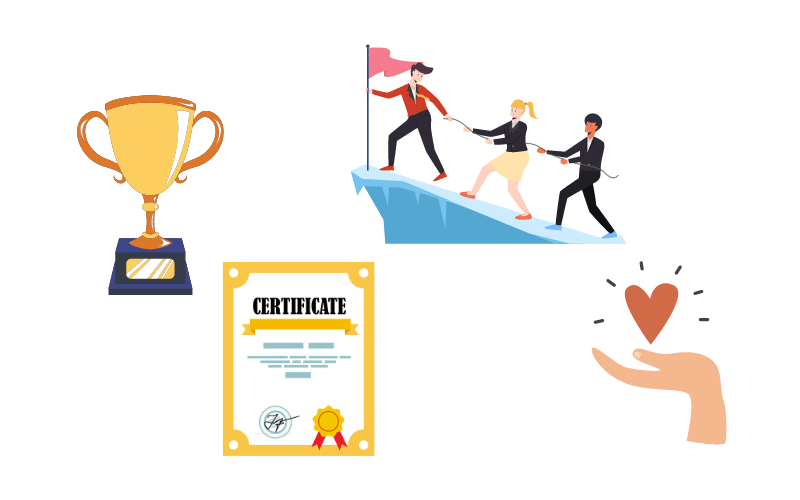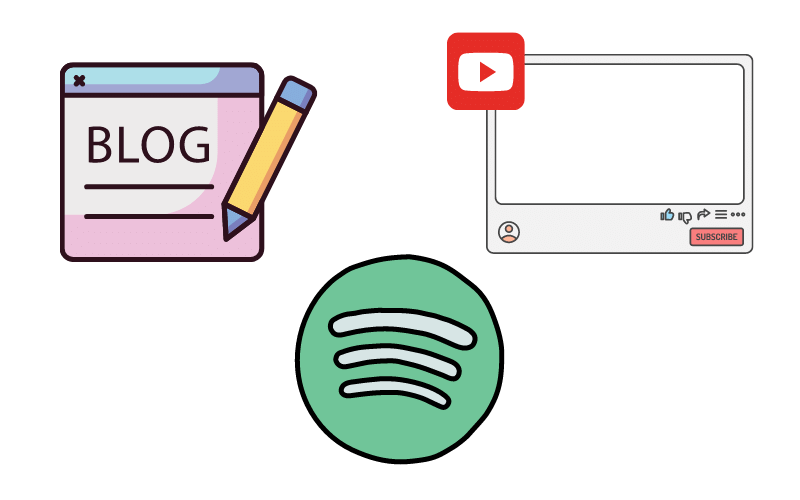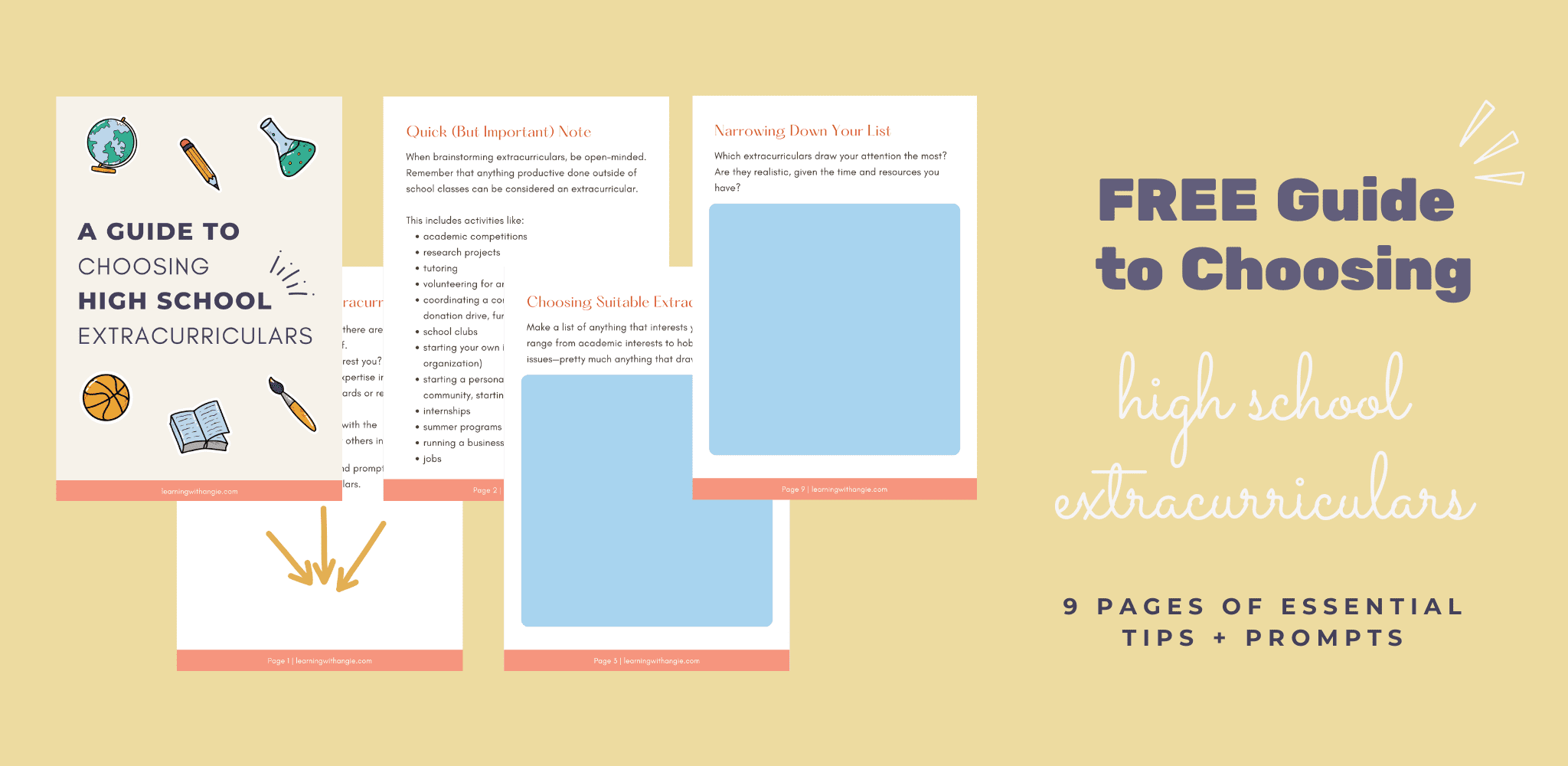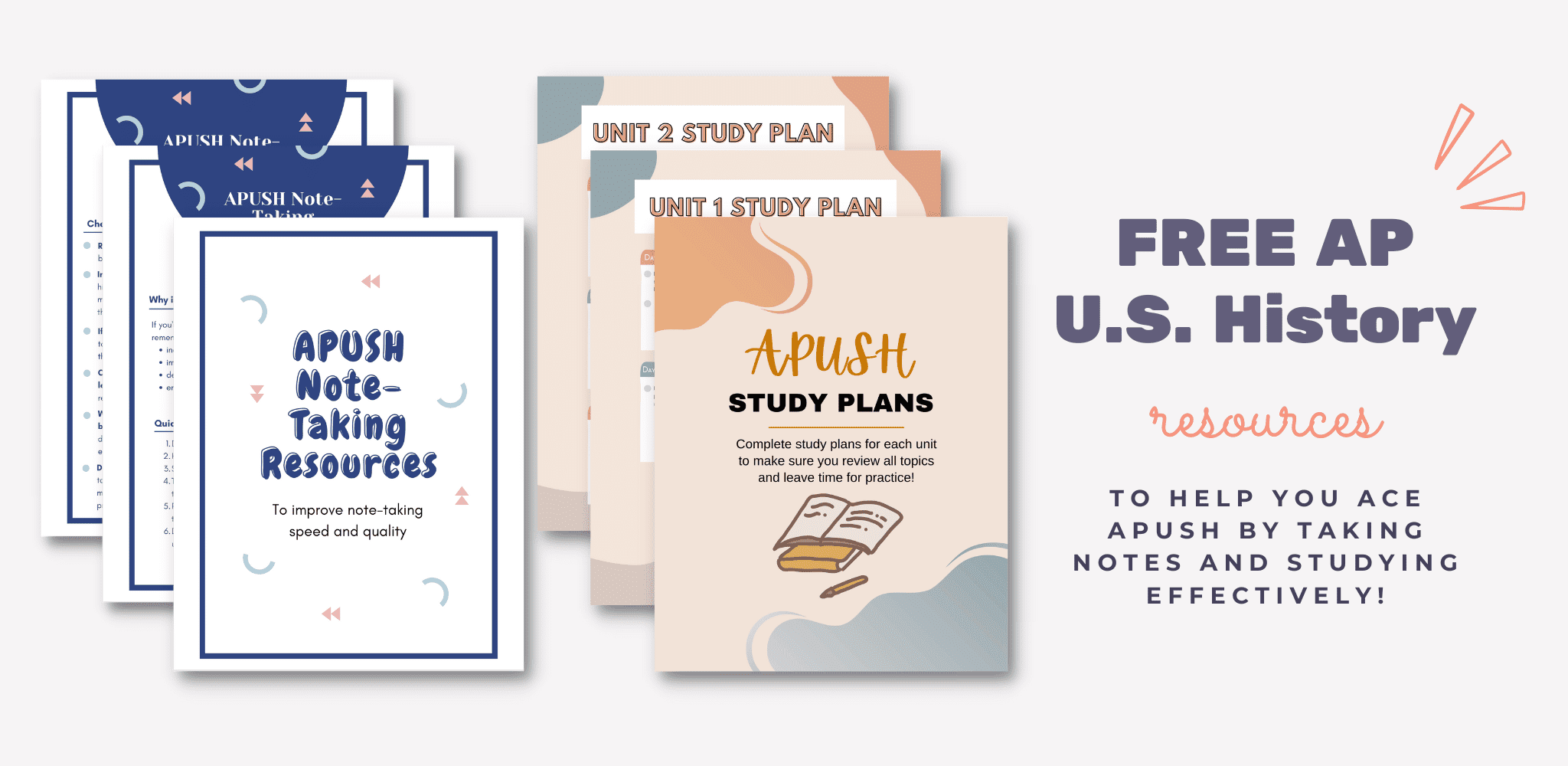

You’re entering your junior year of high school. Or perhaps you’ve already started your junior year.
College applications seem closer than ever. You suddenly feel stressed because you believe you have a severe lack of extracurriculars.
Thoughts like, “What if I won’t be accepted by my dream college? Or even any college?” race through your head.
So in a moment of desperation, you search up, “Is junior year too late to start extracurriculars?”

Before you get too caught up in dejection, remember that you still have at least a year until college applications. That’s plenty of time to get involved in meaningful activities to enhance your application.
In this article, you’ll learn about:
- Why junior year is not too late to start extracurriculars
- Examples of meaningful extracurriculars you can get involved in
- How to get started on these extracurriculars
- How you can incorporate junior year extracurriculars in your college applications
This post may contain affiliate links, which means that when you make a purchase through a link, I make a small commission at no extra cost to you.
Is junior year too late to start extracurriculars?
The answer to this question is quite lengthy, so I’ll do my best to break it down into a few sections:
Reflect On Your Current Extracurriculars
If you want to start new extracurriculars in junior year because you don’t think you have enough, remember this:
Quality >>> Quantity
When college admissions officers review your application, they’re looking for continuity, persistence, and depth. Delving deep into a few extracurriculars is much more impressive than touching the surface of many.
You shouldn’t participate in extracurriculars for the sake of participation. You should participate because you’re passionate and to expand your skill set.
An Example
Let’s say there are two students: Samuel and Miranda.
In our hypothetical situation, Samuel has been playing the violin since she was 7. He practices almost every day, has won many awards, and is the concertmaster of her local youth orchestra.
On the other hand, Miranda has dabbled in several school clubs. She participated in Speech and Debate for a year, then Science Bowl for another, and recently switched to Math Competition.

Although Samuel will be able to fill more spots in the Activities section of his application, his participation in several clubs isn’t as impressive as Miranda’s musical commitment.
So before you consider starting new extracurriculars, evaluate the ones you already have. Have you devoted a lot of time to them? What achievements have you made in them?
It’s the dedication and depth that matters, not the quantity.
“I have good grades but no extracurriculars”
I’ve seen this phrase thrown around a lot online, so I thought I would give my two cents on it.
Here’s the deal:
Acceptable extracurriculars comprise any activity you do outside of required school classes.
This means that things like babysitting, tutoring, long-term hobbies, artistic/musical pursuits, sports, volunteering, and an endless list of other things all count as extracurriculars.
So unless you really don’t do anything productive outside of school, it’s difficult not to have something that’s considered an extracurricular.
But You’re Looking for Something More
However, perhaps you’re not just looking for anything that counts as an extracurricular. You’re looking for something impressive to boost your college applications.
If you’re looking for the “impressive” factor, I’ve got you covered!
In the following sections, I’ll discuss A) how to choose extracurriculars and B) meaningful extracurricular examples.
How to Choose Extracurriculars to Start in Junior Year
When college admissions officers evaluate your application, they’re looking at the whole picture.

So what does this mean for you?
It means that you shouldn’t participate in a bunch of random extracurriculars for the sake of participation.
Instead, you should participate in activities that paint a cohesive picture of who you are—your interests, passions, and motivations.
Here are steps to help you choose suitable extracurriculars:
1. Identify your hobbies
Make a list of things you’re interested in. It could be anything, including simple activities you enjoy doing in your spare time.
Try to create a comprehensive list to assist the brainstorming process.
2. Brainstorm how you can demonstrate expertise or create impact
In my “What Do Colleges Look For?” post I go into detail about what colleges look for in extracurriculars.
The primary points I mention are that you should either A) demonstrate expertise or B) create impact for an extracurricular to be meaningful.
Demonstrating expertise means winning awards or receiving other forms of recognition.
Creating impact means making a positive difference in your local community or on a wider scope.

You should brainstorm ways to accomplish either or both of these goals with current hobbies.
If you’re having trouble brainstorming ways to achieve either of these goals, see the next section for ideas.
Examples of Extracurriculars to Start in Junior Year
Recognition for Hobbies
Receiving some kind of recognition for hobbies demonstrates expertise.
A good starting point is to research competitions that you can participate in. If it’s difficult to find in-person competitions, you can also look into online/remote competitions.
Here are a few examples:
- If you enjoy writing, you can submit a piece to the Scholastic Art and Writing Awards.
- If you enjoy programming, you can enter USACO (USA Computing Olympiad).
- Additionally, I’ve had many coding friends enter app-making contests. If you’re interested, you’ll probably find several by researching on Google.
- If you enjoy musical composition, each state has a Music Teachers Association that holds a yearly composition competition. If you win in the state competition, you can proceed to the regional and potentially even the national competitions.
These are just three examples, but I hope you can see that there are endless competitions out there, both local and remote. By doing some Google research, you should be able to find some that you can participate in!
Internships
Doing internships is an excellent way to A) demonstrate interest in an area and B) expand your skill set.
Nowadays, it’s very easy to find remote internships, if in-person is not feasible.
How to Get an Internship as a High Schooler
You may be wondering: How can I possibly get internships as a high school student? And where do I even start looking?
Luckily, there are many internship programs offered to high school students specifically. You can start by searching “internships for high school students,” and many opportunities will pop up.

Or, you can follow the route I did to get an internship as a high school student:
First, create an account on LinkedIn. It might take you some time to set up a profile, but the interface is very user-friendly. Make sure to include any skills/experiences that would recommend you to potential employers.
Next, search for internship opportunities in the Jobs tab. In the top bar, you can filter results based on several factors, including location, experience level, job title, and job type.
Then, scan through the results and apply for ones that look suitable. Remember to read the job descriptions thoroughly. Also, some may require you to submit a resume, so you should consider putting one together. (There are many student resume templates online.)
Also, one of the great features of LinkedIn is that it will regularly suggest related positions to you.
One more important note about internships:
Consider applying to several positions—it’s not possible to guarantee acceptance from any company.
Summer Programs
Participating in summer programs is another excellent way to A) demonstrate interest in an area and B) expand your skill set.
However, it should be noted that if you’re a junior, doing a summer program before senior year may not be sufficient. Nevertheless, it can still be a great addition to your application, if you supplement it with related activities during the school year.
There are many summer programs offered exclusively to high schoolers that you should start applying to in your junior year.
You can start by searching “summer programs for high school students” to find opportunities.
Research Project
If you haven’t started your junior year yet, you may want to consider doing research under the guidance of a professor.
It may seem scary to reach out to a professor, but cold emailing a professor to do research is a very useful skill you should start building now.

If you have a university near you, start by looking at departments that interest you. Then, look at work published by professors within those departments.
If the work done by a particular professor interests you, send them an email about your interest in doing research. Check out this article for some tips on cold emailing.
Or, if you don’t live near a university, you can email professors to see if they’d be open to remote research.
Participate in Research Competitions
By doing a research project, you’ll have the ability to enter into research competitions.
The Society for Science has an affiliated fair network, in which you start at the regional level, proceed to the state fair, and may eventually move on to the international fair.
However, this is just one example of a research competition you can participate in. There are many other competitions offered at the local, regional, or national levels, which you can find by doing a quick Google search.
Participate in Research Conferences
Doing a research project also allows you to participate in conferences. As with competitions, there are many statewide, regional, and nationwide opportunities for high school research students.
Participating in a conference is a great opportunity to build your presentation skills, receive constructive feedback, and interact with other driven students.

Community Service
There are countless ways you can get involved in your community. Here are some examples:
Volunteer at a Local Non-Profit
Research nonprofits in your area, and look for volunteer opportunities on their website. Many nonprofits are open to having high school volunteers.
As with seeking research opportunities, you’ll need to cold-email nonprofits about your interest in volunteering.
You can get involved in things like:
- Tutoring low-income students
- Hosting a collection for a local food bank
- Volunteering at an animal shelter
- Helping at a beach clean-up
- Performing in concerts at senior care homes
Also, please note that these are just a few examples in the vast sea of opportunities.
Volunteer Remotely
In addition to in-person volunteer opportunities, there are many opportunities to get involved remotely. Here are some examples of remote volunteer opportunities:
- Offer to do website/social media maintenance for a nonprofit.
- Research youth-led nonprofits that you can get involved in. Many offer opportunities to get participate remotely. Opportunities include writing articles, doing website/social media maintenance, doing graphic design, teaching classes, and tutoring, to name a few.

Start Your Own Initiative
Starting your own community service initiative is particularly impressive because it demonstrates your leadership skills.
If you’re not sure how to get started, here are some ideas:
- Organize a community service event. This could be a fundraiser, donation drive, or any other event that helps your community in some way.
- Start your own organization. Choose a cause that you’re passionate about, and create a mission statement. Then, build a team and do outreach to your target audience to scale your organization. If this option seems daunting, check out this step-by-step guide on starting an organization in high school.
Create An Online Community
Creating an inspirational online community is a creative way to leverage the power of the modern digital age.
You can start a blog, podcast, YouTube channel, or even just establish a presence on social media.

Things like blogs, podcasts, and YouTube channels take time to gain traction (unless you have some wild stroke of luck or an extensive network). However, you can grow fairly rapidly on social media.
Social media is a great platform for raising awareness for something you’re passionate about.
For example, I’ve seen students use social media to raise awareness about things like minority rights, environmental protection, and poverty, to name a few.
You can grow very quickly on social media if you implement the right strategies.
I won’t go into detail about social media marketing here, but learning how to network, engage with your audience, build a brand, and leverage trends can take you far.
Once you have an audience, it becomes relatively easy to expand your efforts. You can create partnerships with other brands/organizations and organize virtual or in-person events (depending on your audience), to name two examples.
Or, you could even…
Launch Your Own Business
Once you have an established social media presence (or presence on other online platforms), you can start your own business. This may sound daunting, but there are many viable options for high schoolers.
You can:
- Start a mentorship program. I’ve seen students start programs to mentor students in entrepreneurship (once you’ve mastered social media marketing, you can teach other students about building a brand). I’ve seen other students start programs to mentor peers in productivity. These are just two examples I’ve seen, but you should choose something related to your existing brand.
- Sell products on Etsy or their own website. You can sell digital or physical products.

Digital marketing can become very rewarding quickly, provided that you use the proper strategies. Plus, the skills you learn in marketing and building a brand will help you far into the future.
Is joining a club in junior year too late?
This is a question I frequently see floating around online, so I thought I’d offer my two cents on it.
If you don’t think you can be promoted to an officer position, then it’s probably not worth it. But if you think you have a chance, then you should do your best to leverage the position to make a positive impact on your school community.
My Experience Joining an Honors Society in Junior Year
Honors societies aren’t exactly clubs, but I was accepted into an honors society in my junior year.
Once I was accepted, I demonstrated initiative and passion by engaging in meetings and emailing the faculty advisor about my vision for the society.
As a result of my efforts, I was chosen to be vice president. I proposed and spearheaded several honors society projects, and in my senior year, I became president of the society.
From the experience, I learned that the most important aspect of joining a club is demonstrating passion, responsibility, and initiative.
You cannot simply attend meetings and go with the flow, then expect club membership to enhance your college application.
How to Include Junior Year Extracurriculars in Your College Application
In addition to doing meaningful extracurriculars, you need to show college admissions officers that what you’ve done is meaningful. Here are some tips to help you out:
Tell An Inspiring Story
Talk about the extracurricular(s) in your college application essays.

Explain why you started an extracurricular. Was it some pre-existing passion that motivated you? Was there an inciting incident that gave you the push? Identify a reason.
Then, talk about what you gained from the extracurricular. What did you learn from it? What impact were you able to create?
Describe a few memories or one particularly significant memory to illustrate this. Remember: show, don’t tell.
Finally, talk about how doing the extracurricular will influence you as a college student and beyond.
Here’s an example:
Say you wrote articles on youth mental health for a blog. You could talk about how that has inspired you to continue raising awareness about mental health in college. Mention your interest in leading a mental health club or adding a mental health section to a campus publication.
Write About the Extracurricular in Your Brag Sheet
As a high school junior, you’ll need to put together a brag sheet for your guidance counselor. This brag sheet is extremely important because it’s what your counselor will use to write a letter of recommendation for you.

Since guidance counselors have to manage many students, the brag sheet is often one of the only ways for your counselor to get to know you.
Therefore, it’s important to mention anything unique to you that’ll help you stand out from other students.
In your brag sheet, talk about the extracurriculars you’ve participated in as a junior (and in previous high school grades). Share a meaningful memory of each extracurricular. Mention accomplishments and recognition (numbers and awards help build credibility).
Show them why they should include the extracurricular in their letter.
If you have a chance, schedule a meeting with your guidance counselor to talk about your extracurricular accomplishments. While counselors have access to your grades and course selection, they don’t know much about your extracurricular involvement unless you tell them.
Get An Outside Recommendation Letter
If you worked with an adult supervisor (that’s not a guardian, parent, or family relative), ask them to write a letter of recommendation for you.
Submitting an outside recommendation letter provides credibility for what you accomplished. Additionally, an outside recommender can illustrate a dimension of your personality that can’t be gleaned elsewhere in your application.
For example, if you did an internship, ask your mentor for a letter. If you volunteered in a nonprofit, request a letter from a staff member you worked closely with.
Most supervisors will be more than happy to write a letter for you (provided that you had a good work ethic and attitude).
Junior Year is Not Too Late to Start Extracurriculars
If you’re feeling extremely dejected or stressed about lacking extracurriculars, I hope this article convinced you that junior year is not too late to start extracurriculars.
Nevertheless, you should follow a few guidelines when it comes to extracurriculars:
- Choose meaningful extracurriculars. Don’t participate in random extracurriculars for the sake of participation.
- Choose extracurriculars based on your interests. Being able to demonstrate passion, commitment, and achievement in an extracurricular is what colleges look for. If you’re not interested in what you do, you can’t demonstrate these qualities.
- Research opportunities to expand your skill set. Don’t be afraid to try new things and step outside of your comfort zone. Often, that’s the best way to learn.

To help you choose suitable extracurriculars, I’ve created a 9-page workbook filled with essential tips and prompts. Make sure to check it out!
Also, if you’ve reached the end of this post, let me know in the comments:
- whether you’ve gained a new perspective on starting extracurriculars in junior year, and if so,
- what extracurricular(s) you intend to try out!
If you have any questions, also feel free to let me know!
For more content on high school extracurriculars, check out these posts:
- What Do Colleges Look For? A Step-by-Step Guide to Getting Into Your Dream College
- Importance of Student Leadership in High School + Unique Ways to Show Leadership
- How to Start An Organization in High School in 4 Easy Steps
- How to Promote a School Club—11 Easy Ways to Attract Members
- Does Tutoring Count as Leadership? Here Are 5 Ways It Can Be

Learning With Angie is a place to share honest, unfiltered advice to promote student success. So if you’re a student (high school, college, or beyond) looking for tips on productivity, studying, personal growth, and more to reach your potential, this is the place! To read more about Learning with Angie, click here.



















